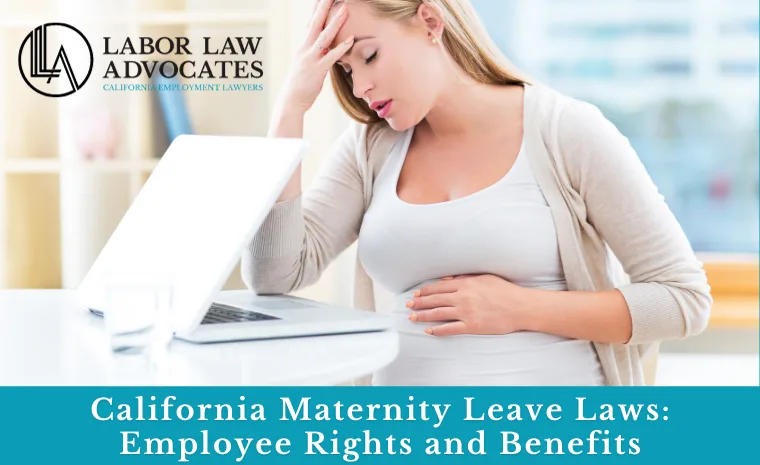In today’s modern workforce, the need for maternity leave is a crucial aspect of employment, allowing pregnant employees to balance their personal and professional lives effectively. Maternity leave laws vary from state to state in the United States, and California has some of the most progressive and comprehensive regulations in place.
In this blog, we will delve into California maternity leave laws, covering:
- California Family Rights Act (CFRA)
- Family and Medical Leave Act (FMLA)
- Pregnancy Disability Leave
- Paid Family Leave
- Fair Employment and Housing Act (FEHA)
We will explain what each of these laws entails, the eligibility criteria for employees, and their associated maternity rights and benefits. Additionally, we will explore the duration of maternity leave, considerations for extended leaves, and the process of filing for leave, as well as what to expect when returning to work after maternity leave.
California Maternity Leave Laws
Maternity leave refers to the period when a woman temporarily steps away from her job to accommodate the birth, adoption, or foster care placement of her new child. In California, numerous women enjoy legal protections that allow them to take time off from work both during and after their pregnancy, all while safeguarding their job security.
California Family Rights Act (CFRA)
The California Family Rights Act is a vital piece of legislation designed to protect the rights of eligible employees in California when it comes to family-related leaves of absence. Under CFRA, eligible employees are granted the opportunity to take up to 12 weeks of unpaid, job-protected leave for specific family-related reasons, including:
- Childbirth: New parents, whether it’s the birth mother or father, can utilize CFRA to bond with their newborn child. This precious time allows parents to create a strong foundation for their child’s development.
- Adoption: CFRA also covers employees who are in the process of adopting a child. This provision ensures that adoptive parents have the same rights and opportunities as biological parents to form crucial early attachments with their new family members.
- Caring for a Seriously Sick Family Member: Beyond parental responsibilities, CFRA recognizes the importance of family caregiving. Eligible employees can take CFRA leave to provide essential care to a family member with a serious health condition. This provision supports the well-being of not only the employee but also their loved ones during challenging times.
- Eligibility criteria: Employees must have worked for their employer for at least 12 months and accumulated at least 1,250 hours in the past year.
Family and Medical Leave Act (FMLA)
The California Family and Medical Leave Act is a critical piece of legislation that serves to protect the rights and welfare of eligible employees in the state of California. This comprehensive act encompasses both family and medical leave, providing essential provisions for employees in need of extended leave for various reasons.
The FMLA allows eligible employees to take up to 12 weeks of unpaid, job-protected leave within a 12-month period. This leave can be used for a range of family and medical-related situations, providing flexibility and support when it’s needed most.
The FMLA covers a broad spectrum of family and medical situations, including:
- Family Care: Employees can use FMLA leave to care for a newborn child, adopted child, foster child, spouse, domestic partner, parent, or registered domestic partner with a serious health condition.
- Serious Health Condition: CFMLA also allows employees to take leave when they are dealing with their own serious health condition. This provision ensures that individuals can prioritize their health without undue hardship like fear of losing their job.
- Military Family Leave: CFMLA provides eligible employees with leave for specific military-related situations, including qualifying exigencies and caring for injured service members.
It’s important to note that the FMLA can run concurrently with other leave laws in California, such as the CFRA. This means that eligible employees may utilize both FMLA and CFRA leave in certain situations, depending on their specific needs and circumstances.
Eligibility criteria: To qualify for FMLA leave, employees must meet certain criteria. They should have worked for their current employer for at least 12 months, during which they accumulated a minimum of 1,250 hours. This ensures that FMLA benefits are available to individuals with a substantial employment history.
Pregnancy Disability Leave (PDL)
Pregnancy Disability Leave Law is a fundamental component of California’s employment laws aimed at safeguarding the well-being and job security of pregnant workers. It specifically addresses situations where pregnancy-related disabilities necessitate temporary time off from work.
PDL provides eligible employees with the opportunity to take up to four months of unpaid time-off. This period is designed to accommodate pregnancy-related disabilities, which can vary in duration and severity from one individual to another.
Most pregnant workers are eligible for PDL by the 36th week of pregnancy, which is approximately four weeks before the due date. For those who have vaginal births without complications, six weeks of leave is typically recommended. However, if a cesarean section (C-section) is performed, a minimum of eight weeks of unpaid leave may be necessary.
PDL encompasses a wide range of conditions and complications that can arise during pregnancy. These may include but are not limited to:
- Gestational diabetes
- Severe morning sickness
- Pregnancy-induced hypertension
One of the most important aspects of PDL is job protection. Employees who take PDL are legally entitled to return to their previous position or an equivalent one with the same pay and benefits upon their return to work. This protection ensures that pregnant employees can prioritize their health and the health of their child without worrying about potential repercussions for their career.
Eligibility criteria: Unlike some other leave programs, PDL does not have a minimum employment duration requirement. This means that all female employees, regardless of how long they have been with their current employer, are eligible to take advantage of PDL benefits when experiencing pregnancy-related disabilities.

Paid Family Leave (PFL)
California Paid Family Leave is a pivotal program designed to assist employees in managing their family responsibilities while maintaining financial stability. This program focuses on providing partial wage replacement to eligible individuals who need to do postnatal care for a new child or a seriously ill family member.
PFL allows eligible employees to take up to eight weeks of leave with partial wage replacement. This benefit is immensely valuable, as it ensures that individuals can balance their family obligations without enduring significant financial strain.
California PFL provides support for two primary scenarios:
- Caring for a New Child: PFL allows parents to bond with and care for their newborn, adopted, or foster child. This valuable bonding time is crucial for the well-being of both parents and their child, facilitating the formation of strong familial bonds during the early stages of development.
- Caring for a Seriously Ill Family Member: PFL recognizes the importance of family caregiving. Eligible employees can use PFL to provide care and support to a seriously ill family member, ensuring they receive the attention and care they need during a challenging time.
Similar to other family-related leave programs in California, PFL comes with job protection. Employees who take advantage of PFL have the right to return to their previous position or an equivalent one with the same pay and benefits when they return to work. This job security ensures that individuals can take the time they need to support their family without fearing adverse employment consequences.
Eligibility criteria: To qualify for PFL benefits, employees must meet certain eligibility requirements. They must have paid into the California State Disability Insurance (SDI) program, which is a state-run program funded through payroll deductions. Additionally, individuals seeking PFL benefits must meet other SDI eligibility criteria, including a minimum income threshold.
Fair Employment and Housing Act (FEHA)
The Fair Employment and Housing Act prohibits discrimination and harassment based on pregnancy, childbirth, and related medical conditions.
Eligibility criteria: Applies to all employees, regardless of the length of service.
Filing for Maternity Leave and Returning to Work
To initiate maternity leave, employees typically need to provide their covered employer with advance notice and medical documentation, especially for PDL. Employers are legally obligated to maintain health insurance coverage during maternity leave, ensuring that employees can access necessary care from an appropriate health care provider.
When returning to work after maternity leave, employees should be reinstated to their previous positions to perform essential functions under their equivalent roles with the same pay and benefits. Employers are prohibited from retaliating or discriminating against employees for taking maternity leave.
Do you have unpaid family leave?
FAQs on Maternity Leave Law
How long is maternity leave in California?
Under California law, eligible employees are entitled to up to 12 weeks of unpaid leave for maternity or pregnancy-related reasons. This period of leave is protected under the California Family Rights Act (CFRA) and the federal Family Medical Leave Act (FMLA). However, if you qualify for California’s Paid Family Leave (PFL) program, you may also receive partial wage replacement during your leave.
Can I pump breast milk at work?
Yes, California law requires that employers provide reasonable break time for employees to express breast milk. This period should be provided for up to one year after the birth of the child. Additionally, employers must provide a private space, other than a bathroom, for employees to pump milk. These accommodations ensure that working mothers can continue to breastfeed their babies while returning to work.
What is considered a reasonable accommodation during pregnancy?
Employers must make reasonable accommodations for pregnant employees to ensure their health and safety. Some examples of reasonable accommodations include altering work duties, providing a modified work schedule, or offering temporary disability leave if necessary. Employers are required to engage in an interactive process with pregnant employees to determine appropriate accommodations based on individual needs.
Can I take additional time off after my 12 weeks of maternity leave?
While the CFRA and FMLA provide up to 12 weeks of protected unpaid leave, some California employees may be eligible for additional time off under other state laws. For instance, the California Pregnancy Disability Leave (PDL) law allows for an additional four months of leave for disability-related pregnancy conditions.
Similarly, if you experience a pregnancy-related disability after the birth of your child, you may be entitled to an additional four months of protected leave. You might need to provide additional documentation for this request, such as medical certification and filled-out appropriate leave request forms.
Do I have to return to the same position after my maternity leave?
Employees who take protected maternity leave are generally entitled to be restored to the same position they held before going on leave or to an equivalent position with the same pay, benefits, and seniority rights. However, there are certain exceptions if the employer can show an unusual business circumstance that makes reinstatement impossible or would cause significant economic injury to the employer’s operations.
Consult with a California Employment Lawyer
Understanding California’s maternity leave laws is essential for both pregnant employees and employers. These laws protect the rights and benefits of expectant mothers, ensuring that they can take the time they need to care for themselves and their families without fear of repercussions. If employers violate these laws, employees have legal options to seek redress. Both parties must be aware of their rights and responsibilities to create a supportive and legally compliant work environment during this important phase of life.
If you suffered a violation of California’s maternity leave laws, we can help you fight for your rights. Labor Law Advocates is dedicated to protecting these rights while holding employers accountable for their unlawful deeds. Understanding California’s maternity laws is essential for both employers and employees, and we hope this guide has given you a better understanding of how they work.
Consult with the most experienced benefits and leave lawyers in California for legal advice today. Speak with one of the experts at Labor Law Advocates for a free consultation. We are available 24/7. Call us at (424)-688-3632.




